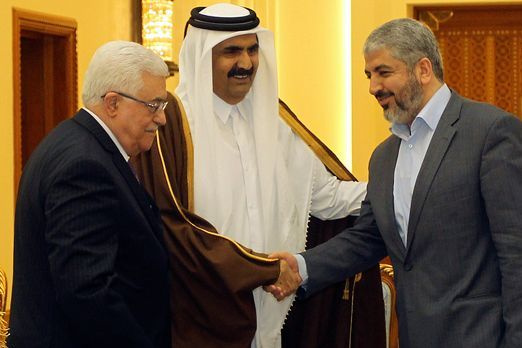Mashal’s Blunder and Hamas’ Pitfall

One week after signing the Doha Agreement between Khaled Mashal and Mahmoud Abbas it is now clear that the leaders of Hamas are dissatisfied with this arrangement. Khaled Mashal, the Syrian Political Bureau Chief, is the person who is receiving the blame due to his failure to gain other Hamas leaders’ consent for this agreement. It seems that this is the beginning of a fundamental dispute that could determine the fate of Hamas.
Mahmoud al-Zahar, one of Hamas’ prominent leaders, criticized the Doha Agreement, stating that he has discussed the content of it with other Hamas leaders and “all” are unhappy; hence it does not have an operational capacity. Mahmoud al-Zahar provided three reasons for Hamas leaders’ disagreement:
1. This agreement reflects the success of Fatah agendas in negotiating with the Zionist regime.
2. Granting Mahmoud Abbas the Prime Minister role in Palestine’s future government is a wrong decision that had been fixed without coordinating with Hamas leaders, and it would guarantee Mahmoud Abbas’ dominance over Palestine’s political system.
3. As the head of the Palestinian government, Mahmoud Abbas would enforce Israel's policies regarding the Palestinian resistance movements, which Hamas finds unacceptable.
Mahmoud al-Zahar’s remarks indicate that Khaled Mashal no longer has the backing of other Hamas leaders and without their consent cannot make any important decisions. This will create many complications for Hamas and is precisely what the Zionist regime has been seeking for a long time --to create a deep division within the Hamas movement to ensure its inability to threaten their security; and furthermore, to exact revenge over their loss of the 22-day long war with Hamas.
It seems that with help from the Qatari sheikhs and their petrodollars, Fatah has managed to conclude its mission as the Zionist regime had desired, by tangling Hamas in a big trap. Hamas is the most powerful movement in Palestine’s struggle against the Zionist regime. Weakening the Hamas movement has been one of Mahmoud Abbas’ main goals and the Hamas leaders are fully aware of that, and have openly declared it many times. It is for this reason that Mahmoud al-Zahar is stating that the Doha Agreement in not applicable and should be substantially revised.
The Doha Agreement was signed on February 6th with the attendance of the Amir of Qatar Sheikh Hamad bin Khalifa Al Thani, the Crown Prince Sheikh Tamim bin Hamad Al Thani, Sheikh Hamid bin Jaber Al Thani (the Prime minister and Foreign Finister of Qatar), Palestinian authority President Mahmoud Abbas, and Khaled Mashal. This agreement emphasizes the formation of a “Government of National Unity” with effective, independent characters as its members and Mahmoud Abbas as its leader. Furthermore, as the agreement declares “this government facilitates the preliminaries to provide presidential elections and Palestinian legislatures, as well as the reconstruction of the Gaza Strip”.
This agreement would ensure that the Fatah leader would be in charge of the government, practically depriving Hamas of any responsibilities in the government.
The Palestinian National Authority and the Palestinian Legislative Assembly elections are soon taking place. With its political history as the Zionist regime’s instrument and its hostility toward Hamas, the Fatah movement would do all it can to gain the majority of seats in the government in order to marginalize Hamas. At this point, not only would Hamas’ appeals not be answered but also internal disagreements and conflicts within Hamas would slow its operations. This is what the Zionist regime is seeking and Fatah is facilitating.
Fatah’s history is filled with Yasser Arafat’s compromises, removing the article on resistance from the Palestinian Liberation Charter, spying on Hamas for the Zionist regime and waging war against Palestinian fighters. Allowing a movement like Fatah, with such a tainted history, to be in charge of signing such agreements is either naiveté or the beginning of a process that would eventually result in compromise with the enemy, and abandonment of arms and battle.
Without a doubt the Hamas leaders have sensed the compromise that would follow the Doha Agreement: a compromise with Qatari petrodollars. Qatari Sheikhs are known for serving the Zionist regime and the US in the Middle East, and are currently the pioneers of enforcing pressure on the Syrian government on behalf of the Zionist regime, the US, and the other Arab nations.

